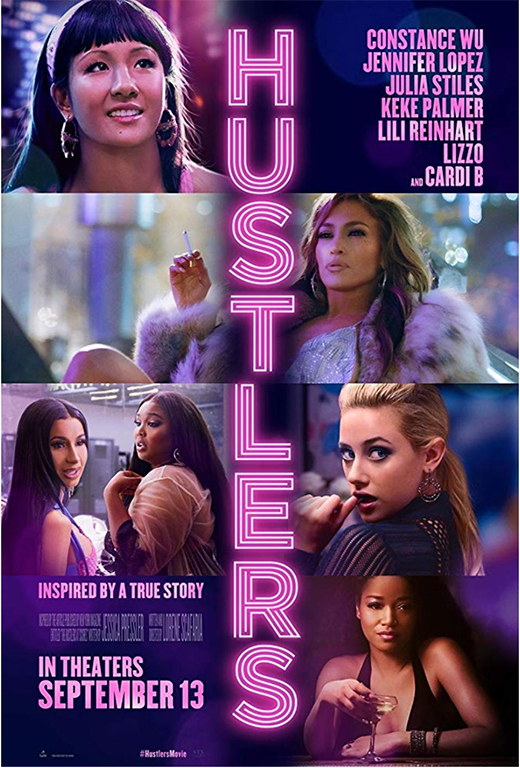By Andrew Hamlin
NORTHWEST ASIAN WEEKLY

![]()
![]()
![]()
![]()
Director and writer Lorene Scafaria based her new film “Hustlers” more-or-less on a true story, “The Hustlers at Scores,” an article by Jessica Pressler published in New York Magazine. The feature film changes some locals, and probably some names, but keeps the hook: Dancers at an upscale NYC strip club learn resilience and sisterhood (or something like it) as they fleece the fat-cat Wall Street clients who come in the door, using, by the end, any means necessary.
“Control,” sings Janet Jackson as the film gets under way and the strippers take the stage. Music’s crucial to strip clubs—usually something uptempo, conducive to bumping and grinding—but from the first moments in this film, music comments on the action and sets tones. The story will be all about control: Who has it, and how. Who can take control, and how. Who gets played for a sucker. And who gets shut out.
Constance Wu stars as Dorothy, a young upstart dancer. She’s beautiful and a little shy, desperately trying to hide her inexperience at dancing and at life in general. She’s smart, but not terribly streetwise. The men who want her shout out “Lucy Liu! Lucy Liu!” because that’s the only sexy Asian lady whose name they can come up with (at least, circa the middle of the last decade, when the story begins). She makes her way as best she can—after all, stripping is the one place she can make a lot of money, fast.
 But Dorothy (soon renamed Destiny) doesn’t have a true direction or a true game plan, until Ramona Vega, played by Jennifer Lopez, takes her under one arm of her huge fur coat.
But Dorothy (soon renamed Destiny) doesn’t have a true direction or a true game plan, until Ramona Vega, played by Jennifer Lopez, takes her under one arm of her huge fur coat.
Ramona’s a little older, which put her in a precarious position at a strip club, where the men tend to skew towards younger bodies. But she puts herself on the map with a jaw-dropping, gravity-defying showcase dance (performed by Lopez herself, without the use of any doubles).
The older lady knows all the ins and outs of working the hustle, too. You try not to get in too deep with the customers. But you do what you can to separate them from their money.
It’s all walking a razor’s edge. But Ramona has ways to make it entertaining. If you focus on living it up, you forget about the dangers and the moral ambiguities.
Wu manages her own star turn, by not trying to overplay anything. From the beginning, Dorothy/Destiny understands the principle, that she has to be anything that the customer wants—lover, succubus, temptress, sometimes even confessor. She learns on the job the delicate art of putting one’s own feelings to one side, for the length of a shift. You see Destiny struggling to learn this. At first, her own emotions show through on her face, though helpfully obscured by the club’s obligatory low lighting. Later, she’ll learn to keep things to herself, minus a flicker of uncertainty here or a too-long blink there. She’s learning what Ramona has to teach. She’s becoming a pro.
And she knows everything she has to know, until the Crash of 2008 comes along. Suddenly everybody’s hurting, even the fellows who pay the strippers. Suddenly the gravy train’s screeched to a halt. The strippers need money to pay their bills, and minimum wage at retail (for those who can even manage that) isn’t cutting it.
And Ramona, always the most ambitious of them all, has a new plan. It involves chicanery, and it involves illegal drugs. But it’s a way to get the train rolling again. And she’s very persuasive.
Criminals have, I suppose, a multitude of time-honored ways to justify what they do.
Ramona has the crash of 2008 to back her up. We’re only screwing over people who have screwed others over, she says to her loyal flock. They take money out of people’s pension funds and spill it all over the dance floor. The system is screwed. The system does not reward people who play honestly.
And she may well be right. Under the movie’s glitz, ready humor, sparkle, and sass, lies the uneasy truth that if you don’t recognize privilege, you’re probably its benefactor. Or to put it another way, morality looks like a privilege that a lot of people can’t afford. You can’t blame them too much for wanting to tip the board so it tilts the other way, towards their pocketbooks.
That much makes sense. But the sadder, deeper undercurrent is the fragility of sisterhood, friendship, and warmth—and the trust that goes with all that. You need to celebrate the moment if you have loved ones, family, this undercurrent whispers, because it can all dry up all too soon. Leaving you with only the fading, thinning sparkle of how you had what seemed to be enough, so you boldly assumed you had it all. And you always would.
“Hustlers” is currently playing in theaters nationwide.
Andrew can be reached at editor@nwasianweekly.com.


